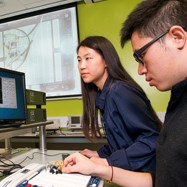Russell Group welcomes 'outstanding' RAE results
18 December 2008
Responding to the publication of the results of the 2008 Research Assessment Exercise (RAE), Director General of the Russell Group, Dr Wendy Piatt, said:
“The 2008 RAE results show the vast amount of outstanding research and innovation across a broad range of disciplines at Russell Group universities. Russell Group institutions continue to be the UK’s leading research universities, driving the UK’s reputation for high-quality research and bringing considerable economic and social benefits to the UK.
“Russell Group universities continue to dominate the landscape of world-class research whichever way you choose to analyse the results. Our institutions excel both in terms of the consistently high quality of our researchers but also in the sheer volume of excellent research. There is a huge number of outstanding academics who conduct research and teach students in our institutions.
“An analysis of the results shows that while the Russell Group represents only 12% of all universities, over 60% of all 4* rated research is undertaken at our universities. Likewise, a ‘gold medal’ rankings show that 18 of the 20 universities which were top of the class on the quantity of 4* research were from the Russell Group (1).
“This success is good news for the UK, as major research-intensive universities are vital to promoting economic prosperity and improving quality of life in this country. Sustaining this success in the face of fierce global competition and severe economic conditions is a significant challenge. It is important that limited government funds are concentrated on fostering excellence and building on success so that the UK can compete with the best in the world and continue to benefit from world-class research. Our leading universities are facing increasingly difficult challenges with income streams under threat, costs increasing and international competition escalating. Now more than ever our research-led institutions have a crucial role to play in helping the UK survive the economic downturn and stimulate a recovery - it is vital that they are given the right conditions to continue to flourish.”
/end.
Notes to editors
- World Leading research at Russell Group universities.
An analysis of the RAE results shows that:
- 21% of research at Russell Group universities is 4* rated compared to 10% for the rest of the sector (excluding Russell Group universities). This means that on average, twice as much of the research undertaken at Russell Group universities is ‘world leading’.
- Using a ‘gold medal table’ –rated by volume of ‘full time equivalent’ (FTE) staff receiving 4* rating- shows 18 of the top 20 are Russell Group universities. The top 17 institutions are all Russell Group universities. All Russell Group universities are in the top 25.
- Using a gold and silver medal table- volume of FTE staff receiving 4* and 3* rating- 18 of the top 20 are Russell Group universities. The top 18 institutions are all Russell Group universities. All Russell Group universities are in the top 26.
- The RAE results can be analysed in a number of ways to produce rankings. Ideally any system used should highlight the quality and quantity of UK universities’ excellent research. Below are some examples of ways of interpreting the results.
- The ‘gold medal’ table. This rates institutions by the volume of 4* ‘world leading’ research. This is calculated by multiplying the % of 4* rated research by the total full time equivalent staff submitted. This focuses on the very best UK research that has been given a 4* rating – defined as “quality that is world-leading in terms of originality, significance and rigour.” This approach measures the volume of world-leading research at a university, giving a comparison of both quantity and quality across institutions
- The ‘gold and silver medal’ table. This rates institutions by the total volume of 4* and 3* research. This is calculated by multiplying the % of 4* rated research by the total full time equivalent staff submitted, doing the same for 3* research and then summing the results. This approach still focuses on UK research that is ‘world leading’ or ‘internationally excellent’: 4* and 3* rating and also measures the volume of world-leading research at a university, giving a comparison of both quantity and quality across institutions
- The Grade Point Average (GPA) –The GPA score is calculated by adding together an institution’s scores (1* - 4*), weighted for the full time equivalent (FTE) number of staff submitted, and then dividing this by the total number of FTE staff submitted. This table does not take account of the volume of world-leading research being undertaken in the university - in theory, an institution that has submitted just 1 staff member could be at the top of the table for research quality if that staff member received a 4*.
- Proportion of Research rated at 3* and 4* – This proposal sums the percentage of research achieving a 4* and 3* rating. This approach also does not take account of the volume of world-leading research being undertaken in the university- as with the GPA- in theory an institution that has submitted just 1 staff member could be at the top of the table for research quality if that staff member received a 4*.
-
Hamir Patel
hamir.patel@russellgroup.ac.uk
020 3816 1316
-
Stephanie Smith
020 3816 1310
 X
X

